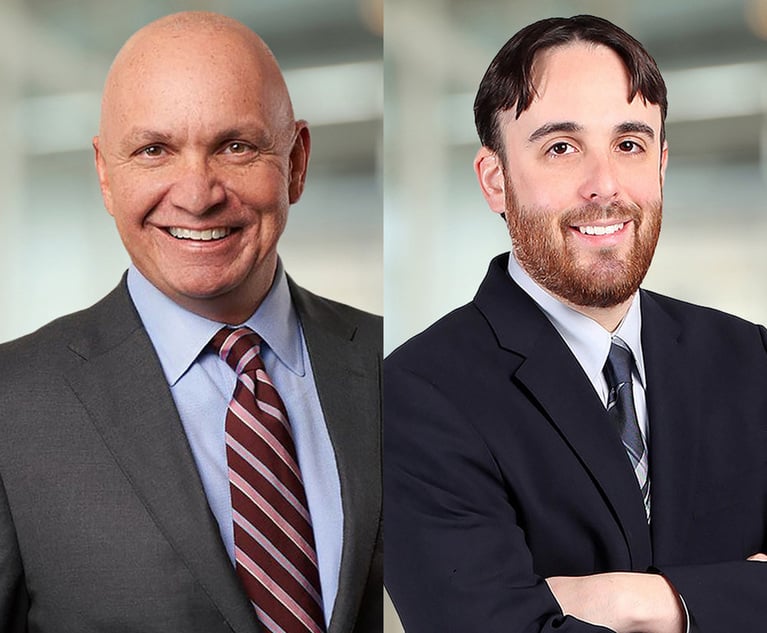Securing Judgment Without Notice of Prior Settlement Is Fraud on Court
A federal appeals court has ruled that New York lawyer Max Folkenflik committed fraud on the court when he obtained a $30 million judgment…
October 18, 2017 at 05:52 PM
6 minute read

A federal appeals court has ruled that New York lawyer Max Folkenflik committed fraud on the court when he obtained a $30 million judgment on a securities case in a New Jersey bankruptcy court without notifying the judge of a prior, multimillion-dollar settlement he obtained from co-defendants in the case in the Southern District of New York.
The U.S. Court of Appeals for the Third Circuit, in a precedential ruling, affirmed a decision from the U.S. District Court for the District of New Jersey that vacated a default judgment against Folkenflik's clients. The District Court ruling affirmed the decision in the case by a bankruptcy judge.
Folkenflik represented investors who claimed that stockbroker Andrew Bressman fraudulently manipulated share prices in the 1990s. Folkenflik made “grossly misleading” representations to the bankruptcy court that illustrate an intent to receive an unjustified recovery, the appeals court said.
“Folkenflik made a deceptive representation to the court in his affidavit, obtained a default judgment, had it trebled, and was awarded interest and attorney's fees. We have no trouble concluding that his failure to disclose the settlement reflects his intent to commit fraud on the court,” the court said in a ruling by Judge Jane Roth, joined by Judges Thomas Ambro and Kent Jordan.
Folkenflik brought civil securities fraud and RICO claims against Bressman and several other defendants in the Southern District of New York. The claims against Bressman, a New Jersey resident, were stayed when he filed a Chapter 11 petition in federal court in Newark. Folkenflik continued to press his clients' case against Bressman's co-defendants, and in 1998 those parties reached a settlement under terms that were kept confidential.
A few months after obtaining the settlement, Folkenflik sought a default judgment against Bressman in the Bankruptcy Court. In response to a court order, Folkenflik submitted a detailed affidavit recounting the history of the case against Bressman and his co-defendants. The affidavit indicated that damages were $5.2 million plus interest, but no mention was made of the prior settlement. Relying on the affidavit, the bankruptcy court entered a default judgment for $5.2 million in February 2000. Folkenflik later submitted another affidavit detailing RICO damages, but again he did not mention the prior, multimillion-dollar settlement reached by the plaintiffs in the case. In July 2003, still unaware of the prior settlement, the bankruptcy court, trebling damages under RICO, entered a judgment for $15.5 million.
Bressman was incarcerated from 2003 until 2006 on a New York state court conviction on charges of enterprise corruption and grand larceny. Folkenflik, believing Bressman was unlikely to have substantial assets, made no attempt to collect the judgment.
But in 2013, believing that Bressman was in line to receive $10 million, Folkenflik set out to collect the $15.5 million judgment, which he said grew to $30 million with interest. He filed ex parte motions in the Southern District of New York and the District of New Jersey for appointment of a receiver to search for and seize Bressman's assets. In New Jersey, the court, citing the passage of a decade and expressing doubt that relief was warranted, denied the application. But in New York, the application was granted and Folkenflik filed a new application in New Jersey to authorize the receiver appointed in New York to act in New Jersey. Contrary to court rules, his second New Jersey application did not reference the earlier application. The second New Jersey application was assigned to a different judge, who granted it, and searches and seizures were executed against Bressman in October 2013.
When Bressman's attorney, David Wander, wrote to Folkenflik to ask if any payments had been made on the judgment, Folkenflik then disclosed the existence of the settlement. The bankruptcy court, learning about the settlement for the first time, found that Folkenflik intentionally withheld mention of the settlement, committing the type of egregious misconduct that constitutes fraud on the court. It vacated the $15 million default judgment and dismissed the adversary complaint with prejudice. U.S. District Judge Kevin McNulty affirmed, and three of Folkenflik's clients appealed.
On appeal, Folkenflik maintained that Bressman's motion to vacate the default judgment was time-barred because it came 10 years after the fact. The appeals court said that the Supreme Court has long recognized the power of federal courts to vacate a fraudulently obtained judgment, even years after it was entered.
Folkenflik also argued on appeal that his conduct did not rise to the level of intentional fraud. The appeals court disagreed, finding that Folkenflik “set out to recover the full amount of the default judgment without any offset for the settlement with the co-defendants.”
The appeals court also rejected Folkenflik's assertion that a claim of fraud on the court can only proceed when it is based on perjurious misconduct. Folkenflik cited irrelevant case law concerning a witness who committed perjury, but an important distinction exists between perjury by a witness and fraudulent conduct directed at the court by one of its officers, the appeals court said.
“The latter has a much greater likelihood of undermining the working of the normal process of adjudication because courts rely on the integrity of their officers,” the appeals court said.
Folkenflik, reached by phone, said the decision “seemed to disregard a lot of evidence” and added that he was bound by an agreement not to disclose the settlement to third parties. He added that Bressman never submitted any proof that he was entitled to any setoff from the settlement, which he said was paid by one of Bressman's former employers.
Michael Sirota of Cole Schotz in Hackensack, representing Bressman, said he was pleased with the ruling.
“The significance is that courts take extraordinarily seriously how lawyers conduct themselves and prohibit interference with the administration of justice and conduct that undermines the court's integrity,” Sirota said.
Asked about the ruling's impact on Folkenflik's clients, Sirota said, “the clients were compensated through the settlement reached in the Southern District of New York, but to the extent that the clients feel they were not completely compensated, they have recourse against their lawyer, should they seek it.”
This content has been archived. It is available through our partners, LexisNexis® and Bloomberg Law.
To view this content, please continue to their sites.
Not a Lexis Subscriber?
Subscribe Now
Not a Bloomberg Law Subscriber?
Subscribe Now
NOT FOR REPRINT
© 2025 ALM Global, LLC, All Rights Reserved. Request academic re-use from www.copyright.com. All other uses, submit a request to [email protected]. For more information visit Asset & Logo Licensing.
You Might Like
View All
Topping Kirkland, Weil Won the Most Valuable Major Bankruptcy Retentions of 2024

How New Jersey’s Pragmatic Bankruptcy Approach Sets It Apart Post-'Purdue Pharma'
7 minute read
Trending Stories
Who Got The Work
Michael G. Bongiorno, Andrew Scott Dulberg and Elizabeth E. Driscoll from Wilmer Cutler Pickering Hale and Dorr have stepped in to represent Symbotic Inc., an A.I.-enabled technology platform that focuses on increasing supply chain efficiency, and other defendants in a pending shareholder derivative lawsuit. The case, filed Oct. 2 in Massachusetts District Court by the Brown Law Firm on behalf of Stephen Austen, accuses certain officers and directors of misleading investors in regard to Symbotic's potential for margin growth by failing to disclose that the company was not equipped to timely deploy its systems or manage expenses through project delays. The case, assigned to U.S. District Judge Nathaniel M. Gorton, is 1:24-cv-12522, Austen v. Cohen et al.
Who Got The Work
Edmund Polubinski and Marie Killmond of Davis Polk & Wardwell have entered appearances for data platform software development company MongoDB and other defendants in a pending shareholder derivative lawsuit. The action, filed Oct. 7 in New York Southern District Court by the Brown Law Firm, accuses the company's directors and/or officers of falsely expressing confidence in the company’s restructuring of its sales incentive plan and downplaying the severity of decreases in its upfront commitments. The case is 1:24-cv-07594, Roy v. Ittycheria et al.
Who Got The Work
Amy O. Bruchs and Kurt F. Ellison of Michael Best & Friedrich have entered appearances for Epic Systems Corp. in a pending employment discrimination lawsuit. The suit was filed Sept. 7 in Wisconsin Western District Court by Levine Eisberner LLC and Siri & Glimstad on behalf of a project manager who claims that he was wrongfully terminated after applying for a religious exemption to the defendant's COVID-19 vaccine mandate. The case, assigned to U.S. Magistrate Judge Anita Marie Boor, is 3:24-cv-00630, Secker, Nathan v. Epic Systems Corporation.
Who Got The Work
David X. Sullivan, Thomas J. Finn and Gregory A. Hall from McCarter & English have entered appearances for Sunrun Installation Services in a pending civil rights lawsuit. The complaint was filed Sept. 4 in Connecticut District Court by attorney Robert M. Berke on behalf of former employee George Edward Steins, who was arrested and charged with employing an unregistered home improvement salesperson. The complaint alleges that had Sunrun informed the Connecticut Department of Consumer Protection that the plaintiff's employment had ended in 2017 and that he no longer held Sunrun's home improvement contractor license, he would not have been hit with charges, which were dismissed in May 2024. The case, assigned to U.S. District Judge Jeffrey A. Meyer, is 3:24-cv-01423, Steins v. Sunrun, Inc. et al.
Who Got The Work
Greenberg Traurig shareholder Joshua L. Raskin has entered an appearance for boohoo.com UK Ltd. in a pending patent infringement lawsuit. The suit, filed Sept. 3 in Texas Eastern District Court by Rozier Hardt McDonough on behalf of Alto Dynamics, asserts five patents related to an online shopping platform. The case, assigned to U.S. District Judge Rodney Gilstrap, is 2:24-cv-00719, Alto Dynamics, LLC v. boohoo.com UK Limited.
Featured Firms
Law Offices of Gary Martin Hays & Associates, P.C.
(470) 294-1674
Law Offices of Mark E. Salomone
(857) 444-6468
Smith & Hassler
(713) 739-1250







